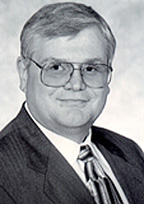Sam Augustine, Pharm.D., associate professor of pharmacy practice in the UNMC College of Pharmacy, has been selected as the recipient of the American Pharmaceutical Association Academy of Pharmacy Practice and Management (AphA-APPM) William H. Briner Distinguished Achievement Award in Nuclear Pharmacy Practice.
Dr. Augustine was selected in recognition of his efforts as an educator, innovator and researcher in advancing the profession of pharmacy and, in particular, as a pioneer in the practice of nuclear pharmacy.
“I’m very surprised, and humbled, to receive this award,” Dr. Augustine said. “Bill Briner is one of the fathers of nuclear pharmacy. He really started the work at the National Institutes of Health to get pharmacists involved with radioactive dosage forms. I’m honored to receive an award named after him.”
Nuclear pharmacy is a specialty area of pharmacy practice dedicated to the compounding and dispensing of radioactive materials for use in procedures that deal with radioactive sources. Often, people with specific cancers are treated through these means. After the radioactive materials are given to a patient, nuclear pharmacists use a specific detection device called a gamma camera to detect the emissions given off by the radioactive material and create images of the relative distribution of the radioactive source in the body.
Dr. Augustine received the nuclear medicine award for his work as part of a team of UNMC/NHS professionals who treat non-Hodgkin’s lymphoma patients. Dr. Augustine was not only involved in the traditional activities of pharmacy, but also assisted in the administration of the radioactive portion of the therapy. Through measuring the initial dose and taking images of how the drug was dispersing through the body, the team determined the optimal therapeutic dose. Dr. Augustine personally treated 475 patients with the novel therapy. In doing so, he paved the way for pharmacists to realize the potential of patient-centered pharmaceutical care in the nuclear pharmacy environment.
“I’m amazed by the level of patient care delivered by NHS/UNMC — the professionalism, empathy and general attitude of everyone involved – in the treatment of patients with non-Hodgkin’s lymphoma,” Dr. Augustine said. “And the courage of the patients just overwhelmed me … Someone said that only nice people get non-Hodgkin’s lymphoma, and I agree. Every one of the patients was just really nice.”
Dr. Augustine has been an active scholar and educator in the areas of nuclear pharmacy, parenteral pharmaceutical formulations and extemporaneous compounding. He has authored one book chapter, 24 peer-reviewed publications and seven professional publications. He has presented more than 30 reports of original research at national and international scientific professional meetings. He was also co-author of two important publications on the topic of quality assurance of pharmacy-prepared sterile parenteral products. He now serves on the U.S. Pharmacopeia Parenteral Products Compounding and Preparation Expert Panel.